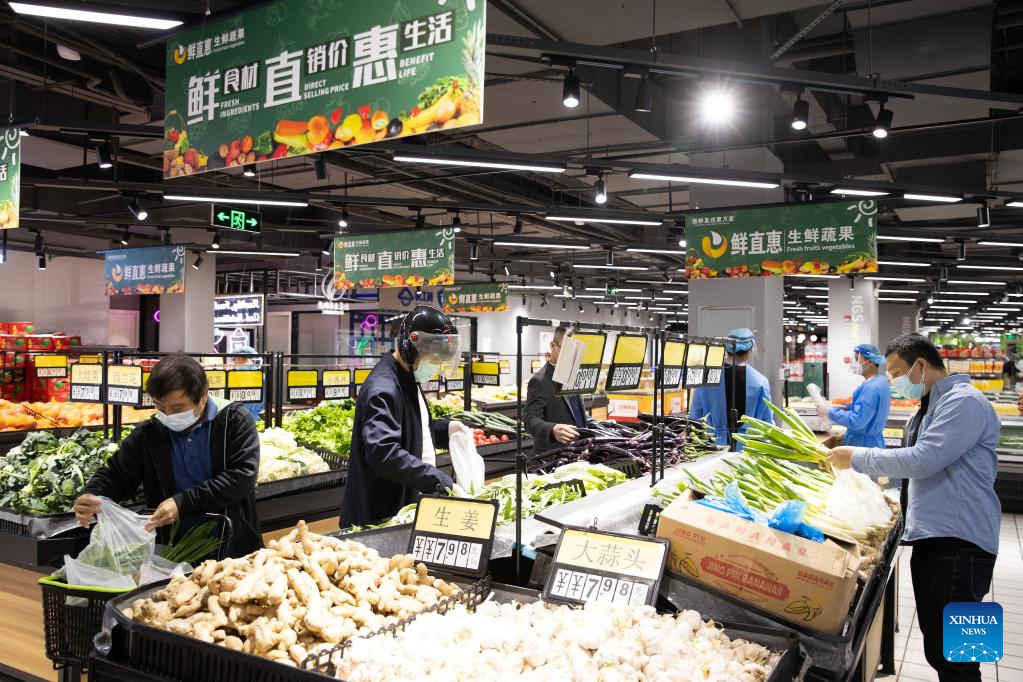
China's financial hub Shanghai is gradually reopening commercial outlets such as shopping malls, convenience stores and pharmacies from Monday after weeks of closed management to ward off COVID-19.

People shop at a supermarket in Xuhui District of east China's Shanghai, May 16, 2022. (Xinhua/Jin Liwang)
The move came after the megacity, with a population of over 24 million, has cut off the community transmission of COVID-19 in 15 out of its 16 districts.
At present, the number of people living in "closed management areas" has dropped to no more than 1 million, and the epidemic has been effectively brought under control, according to a press conference on COVID-19 prevention and control held Monday.
On Sunday, the number of new local COVID-19 infections came in under 1,000 for the first time in over 50 days, with 69 confirmed cases and 869 asymptomatic carriers, according to the municipal health commission.
"We received the notice to reopen on Sunday night and we reopened to customers on Monday morning after overnight preparations," said Dong Xiaofang, a manager at the Liuzhou Road outlet of NGS Supermarket Group Co., Ltd. in Xuhui District.
Outside the store, over a dozen customers wearing face masks were seen queuing up at the entrance at intervals of 2 meters on Monday. After customers scan their codes, a digital machine immediately displays their health code and temperature, as well as their antigen and nucleic acid test results, to see if they meet the requirements for admission.
Li Jia bought seasoning and fresh fruits and vegetables at a physical supermarket for the first time since the outbreak began. Compared with the limited choices and unstable logistics of group purchasing, the brick-and-mortar store offers a great variety of fresh products at more affordable prices, Li said.
"Shopping in physical supermarkets feels quite different," Li said. "When I see these green vegetables, I feel my confidence slowly recover."
The store caps the number of customers shopping at the same time and also closes for one hour at noon for disinfection, Dong said.
The outlet opened its online business on April 15, with over 10 employees working to meet group-purchasing orders from nearby hospitals and residential quarters.
At an outlet of Yonghui Superstores in Xuhui District, goods are weighed and packaged in advance to help reduce gatherings.
Chen Weijie, the outlet manager, said the inventory of goods is three to five times normal levels to meet the offline shopping demand of nearby residents.
Bright Food (Group) Co., Ltd. is planning to reopen about 150 outlets in the coming two weeks. By then, over 80 percent of its 1,000 supermarkets and convenience stores will have reopened to customers.
Many restaurants and coffee shops in the city are also reopening to offer delivery and takeout services.
Shanghai has been vigorously promoting the opening of business outlets and the return of personnel to ensure the supply of daily necessities, vice mayor Chen Tong told a press briefing on Sunday.
The number of commercial outlets operating in the metropolis has increased from the lowest point of less than 1,400 to 10,625, with daily delivery orders hitting 5 million, Chen said.
Commercial outlets such as shopping malls, department stores, supermarkets, convenience stores and pharmacies are among the first to gradually resume in-store operations in an orderly manner and with reduced capacity. Vegetable markets, restaurants, and hair salons will also gradually resume on-site business.
From June 1 to mid-late June, Shanghai will fully restore the normal order of production and life across the city with routine COVID-19 prevention and control measures, while strictly preventing any resurgence of COVID-19, Zong Ming, vice mayor of Shanghai, said on Monday.